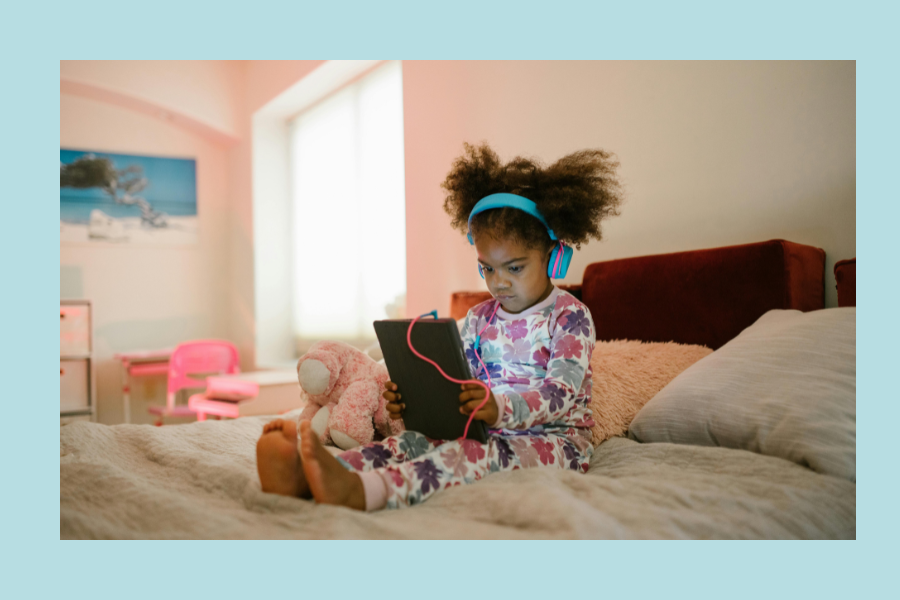In today’s digital world, screen time often gets a bad rap. But for military families—where deployments and training can mean weeks or months apart—screen time can be a powerful bridge for maintaining connection.
When used intentionally, it becomes more than just entertainment—it becomes comfort, learning, and a way to strengthen the bond between parent and child. Programs like United Through Reading (UTR) make this possible by letting service members record themselves reading a story and send the video home for their children to enjoy again and again. Research on intentional screen time shows that this kind of engagement benefits children’s literacy and emotional well-being, especially when it involves repeated engagement and active participation.
1. Treat Storytime Like a Reunion
Seeing a parent’s face—even on a screen—reassures children emotionally. Recordings allow kids to hear familiar voices, see loving expressions, and find comfort and routine amidst the unpredictability of military life. Research on joint media engagement highlights that positive adult–child interaction during reading (even virtually) supports vocabulary building, comprehension, and emotional security.
2. Choose Books that Matter
Pick stories that reflect your child’s interests, favorite characters, or current stage of life. Books about bravery, friendship, or change can be especially meaningful during times of transition—something military kids know well.
3. Make it Personal
Before or after reading, include a personalized message: “I picked this one for you because I know how much you love dinosaurs!” Act out the story using different voices or tones. Research on interactive read‑alouds shows that this keeps kids engaged and supports language development.
4. Watch Together Again and Again
One of the most significant benefits of UTR recordings is that they can be replayed—something children often love. Each repeat viewing offers emotional reassurance and reinforces vocabulary, sequencing, and comprehension skills.
5. Make it a Routine
Create something predictable, like “Daddy Reading Time” or “Mommy’s Book Corner.” Regular reading time gives children a sense of security—even when their parent is far away.
6. Encourage Interaction
Ask questions before or after watching, such as “What do you think will happen next?” or “Can you find your favorite page?” These prompts create dialogue and support comprehension skills, even if the conversation happens around a recorded video. You can even invite your child to respond via video, send a drawing, or record their own story. Research on dialogic reading shows that this approach boosts vocabulary and comprehension.
7. Link It to Literacy Goals
Reading aloud—whether in person or via screen—builds vocabulary, story sequencing, and overall literacy skills. Programs like UTR help bridge the gap when parents can’t be present, ensuring reading remains a core part of a child’s life. Findings from the National Literacy Trust support the role of shared reading in developing these skills.
8. Use It for Milestone Moments
Deployments don’t pause birthdays, holidays, or “first day of school” nerves. Record a story for those special days, so children feel your presence during important moments.
9. Record Replies
Connection works both ways. Have your child send something back—a question about the story, a recorded “thank you,” or artwork inspired by the book. This keeps communication going and reinforces the idea that stories are part of an active, two-way relationship.
10. Use the Same Book at Home
One of UTR’s biggest strengths is that the child receives the same book that the service member reads on video. Following along, turning the pages, and seeing the pictures while hearing their parents’ voices deepens comprehension and builds reading confidence.
The Bigger Picture: Why This Matters
Not all screen time is created equal. Passive, background media may not benefit children—but intentional, interactive experiences like recorded storytime build emotional resilience, strengthen family bonds, and foster a lifelong love of reading. It offers something even more priceless for military families: presence during absence. Screen time becomes a research-backed approach to literacy and emotional well-being when you layer in personal messages, repeated viewings, interactive dialogue, and thoughtful book choices.
United Through Reading proves it’s not just about watching—it’s about connecting, learning, and creating memories that last long after the screen turns off. Get started today with our free app and bring a positive screen time routine into your home!

